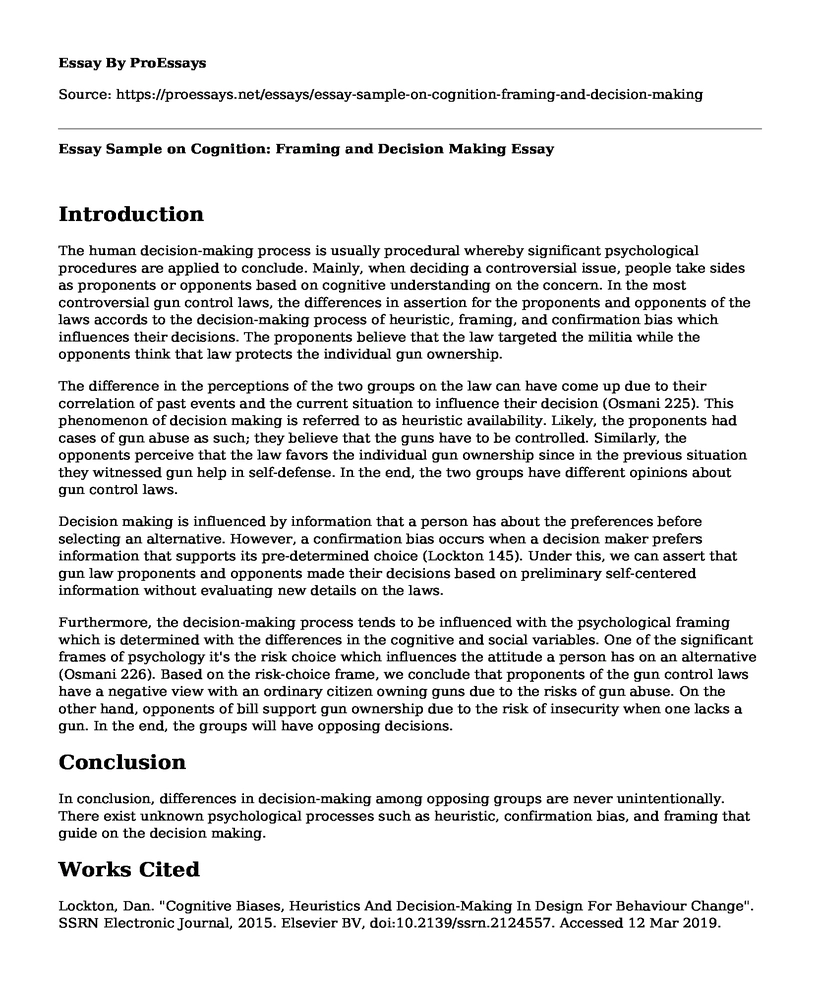Introduction
The human decision-making process is usually procedural whereby significant psychological procedures are applied to conclude. Mainly, when deciding a controversial issue, people take sides as proponents or opponents based on cognitive understanding on the concern. In the most controversial gun control laws, the differences in assertion for the proponents and opponents of the laws accords to the decision-making process of heuristic, framing, and confirmation bias which influences their decisions. The proponents believe that the law targeted the militia while the opponents think that law protects the individual gun ownership.
The difference in the perceptions of the two groups on the law can have come up due to their correlation of past events and the current situation to influence their decision (Osmani 225). This phenomenon of decision making is referred to as heuristic availability. Likely, the proponents had cases of gun abuse as such; they believe that the guns have to be controlled. Similarly, the opponents perceive that the law favors the individual gun ownership since in the previous situation they witnessed gun help in self-defense. In the end, the two groups have different opinions about gun control laws.
Decision making is influenced by information that a person has about the preferences before selecting an alternative. However, a confirmation bias occurs when a decision maker prefers information that supports its pre-determined choice (Lockton 145). Under this, we can assert that gun law proponents and opponents made their decisions based on preliminary self-centered information without evaluating new details on the laws.
Furthermore, the decision-making process tends to be influenced with the psychological framing which is determined with the differences in the cognitive and social variables. One of the significant frames of psychology it's the risk choice which influences the attitude a person has on an alternative (Osmani 226). Based on the risk-choice frame, we conclude that proponents of the gun control laws have a negative view with an ordinary citizen owning guns due to the risks of gun abuse. On the other hand, opponents of bill support gun ownership due to the risk of insecurity when one lacks a gun. In the end, the groups will have opposing decisions.
Conclusion
In conclusion, differences in decision-making among opposing groups are never unintentionally. There exist unknown psychological processes such as heuristic, confirmation bias, and framing that guide on the decision making.
Works Cited
Lockton, Dan. "Cognitive Biases, Heuristics And Decision-Making In Design For Behaviour Change". SSRN Electronic Journal, 2015. Elsevier BV, doi:10.2139/ssrn.2124557. Accessed 12 Mar 2019.
Osmani, Juliana. "Heuristics And Cognitive Biases: Can The Group Decision-Making Avoid Them?". Academic Journal Of Interdisciplinary Studies, 2016. Walter De Gruyter Gmbh, doi:10.5901/ajis.2016.v5n3s1p225. Accessed 12 Mar 2019.
Cite this page
Essay Sample on Cognition: Framing and Decision Making. (2022, Dec 05). Retrieved from https://proessays.net/essays/essay-sample-on-cognition-framing-and-decision-making
If you are the original author of this essay and no longer wish to have it published on the ProEssays website, please click below to request its removal:
- My Meditation Experience
- Bullying and Suicide in Adolescents Essay
- Description and Symptoms of Bipolar Disorder Essay
- Essay Sample on Assessing and Treating Clients With Anxiety Disorders
- Neurological Disorders: Alzheimer, Epilepsy, Parkinson's, Brain Tumors, Stroke, Migraine +more - Essay Sample
- Free Essay Example on Thorndike's Law of Effect: Stimuli-Response & Reinforcement
- Essay Sample on People's Addiction to Their Phones







